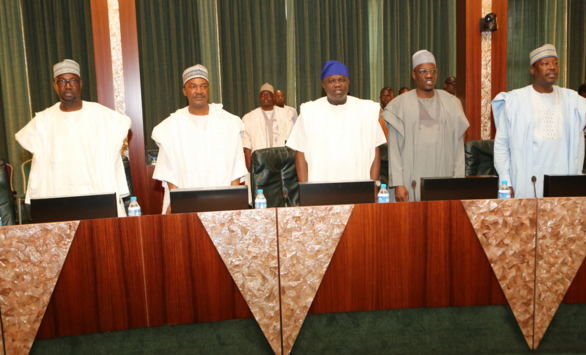
The National Economic Council, NEC is a body established under the Constitution of the Federal Republic of Nigeria, 1999 (as amended) ; and entrusted with the power of advising the President concerning the economic affairs of the Federation, and in particular on measures necessary for the coordination of the economic planning efforts or economic programmes of various governments of the Federation.
The Council arose from a recent meeting to announce the pumping of N350 billion into the economy to revamp it.
The National Economic Council is composed of the Vice President (who is Chairman); the 36 State Governors and the Governor of the Central Bank of Nigeria.
However, the Governor of Cross River State, Senator Ben Ayade was conspicuously missing from such an important economic meeting.
Governor Ben Ayade has travelled out of the country since January 2016 supposedly on a tour to attract investors to the State.
However, Governor Ayade failed to comply with the provisions of Section 190 subsection 1 of the Constitution of the Federal Republic of Nigeria,1999 that provides that when the Governor is proceeding on vacation OR is unable to discharge the functions of his office, he shall transmit a written declaration to the Speaker of the House of Assembly to that effect, and until he transmits to the Speaker of the House of Assembly a written declaration to the contrary the Deputy Governor shall perform the functions of the Governor as Acting Governor.
Since January 2016, Governor Ayade has not being able to discharge the functions of his office because of his absence from the State.
Till the time of the meeting of the Council, Governor Ayade was been absent from the State for more than 45 days.
Section 190 subsection 2 of the 1999 Constitution is to the effect that in the event that the Governor is unable or fails to transmit the written declaration mentioned in subsection (1) of Section 1 of the Constitution within 21 days, the House of Assembly shall, by a simple resolution of the vote of the House mandate the Deputy Governor to perform the functions of the office of the Governor as Acting Governor, until the Governor transmits a letter to the Speaker that he is now available to resume his functions as Governor.
The Cross River State House of Assembly has regrettably turned a blind eye to the failure of Governor Ayade to transmit a written declaration to its Speaker that he would not be unable to discharge the functions of his office because of his absence from the State since January 2016.
The dialectical consequence of these infractions by Governor Ayade and the Cross River State House of Assembly was that the State was not represented in the summit of the National Economic Council, were far reaching measures to resuscitate the national economy were deliberated and important decisions taken because of the failure of Governor Ayade to comply with Section 190 (1) of the Constitution to enable the Deputy Governor of the State, Professor Ivara Esu take over the functions of his office as Acting Governor.
It is disheartening that Cross River State which is one of the States in the country hard hit by the present financial crunch caused by the drop in revenue allocation arising from unprecedented fall in the price of crude oil in the international market was not represented in such an important economic summit.
Despite, the economic crunch, the bureaucracy under Governor Ayade has astronomically increased with the appointment of 28 Commissioners; 40 Special Advisers and hundreds of Personal Assistants and members of Boards, Commissions and Parastatals.
One of the important decisions taken by the National Economic Council is an advisory to State governments to reduce the number of Commissioners and other appointments in their bureaucracies.
Okoi Obono-Obla